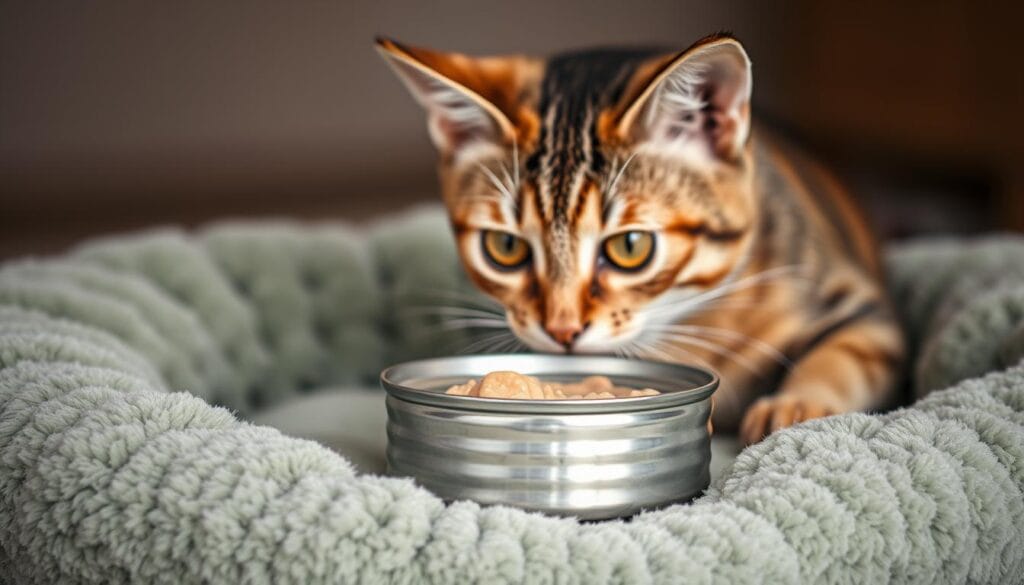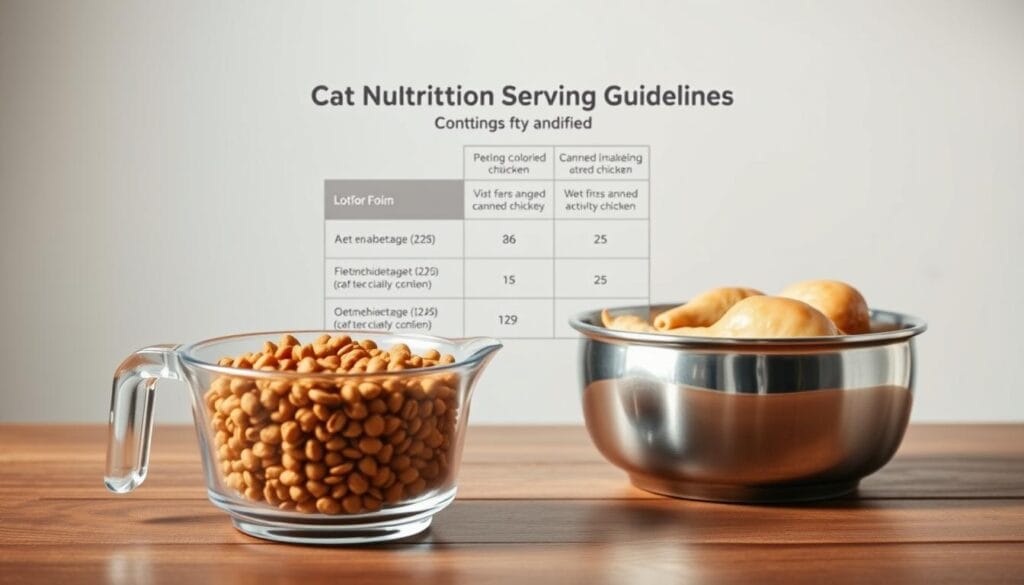Can cats eat canned chicken as part of their diet?
Every cat owner knows the soulful gaze at mealtime. Those pleading eyes ask, “What’s on the menu today?” The question often comes up: can cats eat chicken? Is canned chicken safe and nutritious for our feline friends?
Chicken is a staple for humans, but it’s different for cats. Cats have special dietary needs that are different from ours. Sharing your canned chicken might seem tempting, but it’s important to check if it’s good for them.
Is chicken good for cats? The answer is not simple. Cats need animal protein to thrive. Canned chicken might offer some benefits, but it’s not that easy.
In this guide, we’ll dive into feline nutrition. We’ll see if canned chicken can be part of your cat’s diet. We’ll look at their dietary needs, potential risks, and benefits. This will help you make the best choices for your cat’s meals.
Table of Contents
Understanding Cats’ Nutritional Requirements as Obligate Carnivores
Cats have special dietary needs that make them different from other animals. They need a diet mainly made of animal protein to stay healthy. When thinking about if cats can eat chicken, knowing their nutritional needs is key.
Cats have evolved to get most of their nutrition from meat. Their bodies are best at getting nutrients from animal proteins. This makes chicken a good choice for their diet, especially for pet owners.
Essential Amino Acids in a Cat’s Diet
Cats can’t make some important amino acids on their own. This makes their diet different from others. Key amino acids include:
- Taurine: Crucial for heart health and vision
- Arginine: Essential for protein metabolism
- Methionine: Supports skin and coat health
The Role of High-Quality Protein
Protein is very important for cats. High-quality protein sources like chicken help build muscles, boost the immune system, and give cats energy. Lean meats give cats the nutrients they need without too much fat.
Importance of Proper Hydration
Cats don’t drink much water, so they need to get moisture from their food. Wet foods, like canned chicken, help them stay hydrated. This is important for their urinary tract health and overall well-being.
Can cats eat canned chicken and Is It Safe?

Pet owners often wonder about feeding their feline friends canned chicken. It’s important to know if it’s safe and nutritious. Canned chicken can be a tasty treat for cats, but it needs to be chosen carefully and given in moderation.
Not all canned chicken products are the same. Cats can have raw chicken in certain situations, but canned chicken needs extra attention. The main things to consider are:
- Sodium content
- Potential additives
- Preservation methods
- Nutritional value
Choosing the right canned chicken for cats means looking closely at the ingredients. Choose varieties with little salt and no extra spices or seasonings. Many canned chicken products for humans have ingredients that can harm cats.
| Chicken Type | Safety for Cats | Recommended Frequency |
|---|---|---|
| Plain Canned Chicken | Generally Safe | Occasional Treat |
| Seasoned Canned Chicken | Not Recommended | Avoid |
| Low-Sodium Canned Chicken | Safest Option | Moderate Servings |
Start with small amounts of canned chicken when introducing it to your cat’s diet. Watch for any bad reactions or stomach problems. Always talk to your vet to make sure the canned chicken is right for your cat’s diet.
Benefits of Canned Chicken for Feline Health
Understanding if chicken is good for cats means looking at its nutritional benefits. Canned chicken can be great for your cat’s diet. It offers important health benefits that help keep them well.
Cats have special dietary needs. Is chicken good for cats? Yes, it is, thanks to its nutritional profile that supports their health in many ways.
Protein Content and Muscle Development
Lean protein in canned chicken is key for your cat’s muscles. Cats need high-quality protein to:
- Support muscle growth and maintenance
- Provide essential amino acids
- Boost overall energy levels
- Maintain a healthy body weight
Moisture Benefits for Urinary Health
Canned chicken is also great for keeping cats hydrated. Felines often struggle with adequate water intake. Moisture-rich foods like canned chicken are vital for their urinary health. The natural water content helps:
- Prevent urinary tract infections
- Support kidney function
- Reduce risk of crystal formation
- Promote optimal hydration
Natural Source of Taurine
Chicken is a natural source of taurine, an amino acid cats need. Taurine is important for:
- Heart muscle function
- Vision maintenance
- Reproductive health
- Immune system support
When we ask if chicken is good for cats, these benefits show it’s a nutritious choice for them.
Potential Risks and Safety Considerations
When thinking about can cats eat raw chicken, pet owners need to know the risks. Raw chicken can carry harmful bacteria like Salmonella and Campylobacter. These can cause serious stomach problems and even life-threatening infections.
Cats have special dietary needs, but they shouldn’t eat uncooked meats. While they might eat raw chicken in the wild, domestic cats need safe, prepared proteins.
- Bacterial contamination risks
- Potential parasitic exposures
- Digestive system vulnerabilities
- Potential transmission of foodborne illnesses
Sodium in canned chicken is another big concern. Too much sodium can cause dehydration and kidney problems in cats. Always look for low-sodium options when adding chicken to their diet.
Allergic reactions are also a risk. Some cats might react badly to chicken, showing skin problems, stomach issues, or breathing troubles. Start with small amounts and watch for any signs of trouble.
It’s crucial to store and handle chicken safely. Keep opened canned chicken in the fridge, use it within the recommended time, and avoid mixing it with other foods.
Getting advice from a vet is the best way to know what’s safe for your cat.
How to Choose the Right Canned Chicken Products
Choosing the right canned chicken for your cat is important. Can cats eat chicken safely? It depends on picking high-quality products that fit your cat’s needs.
Pet owners need to read labels carefully. Knowing what’s in your cat’s food can greatly impact their health.
Reading Labels and Ingredients
Not all canned chicken is the same. Look for these important features when picking chicken for your cat:
- Real chicken as the first ingredient
- Minimal processing
- No artificial preservatives
- High protein content
Avoiding Harmful Additives
Some ingredients can harm your cat. Avoid products with:
- Artificial colors
- Excessive chemical preservatives
- Unnecessary fillers
- Artificial flavors
Sodium Content Awareness
It’s important to watch sodium levels in canned chicken. Too much salt can harm your cat’s health.
| Sodium Level | Cat Health Impact |
|---|---|
| Low (Less than 100mg/100g) | Ideal for feline diet |
| Medium (100-200mg/100g) | Use sparingly |
| High (Over 200mg/100g) | Potential health risks |
Remember, quality and moderation are crucial when wondering if cats can eat chicken. Always talk to your vet to make sure you’re making the best choices for your cat.
Proper Serving Sizes and Feeding Guidelines

When thinking about whether cats can eat chicken, it’s important to control portions. Knowing the right serving sizes helps cat owners add chicken as a healthy part of their pet’s meals.
Serving guidelines for chicken depend on several key factors:
- Cat’s age
- Weight
- Overall health status
- Existing dietary requirements
Is chicken good for cats? Yes, but in moderation. Here’s a guide on how much chicken to serve:
| Cat Age Group | Daily Chicken Serving | Frequency |
|---|---|---|
| Kittens (under 6 months) | 2 teaspoons | 2-3 times per week |
| Adult Cats (6-12 months) | 2 tablespoons | 3-4 times per week |
| Senior Cats (12+ months) | 1-2 tablespoons | 2-3 times per week |
Start with small amounts of chicken when adding it to your cat’s diet. Slowly increase the portions while watching how your cat reacts. Make sure the chicken is plain, cooked, and without any seasonings or additives that could be harmful.
Remember, canned chicken should be a supplement, not a replacement for a balanced cat food diet. Talk to your vet to make a nutrition plan that fits your cat’s health needs.
Alternative Protein Sources for Cats
While chicken is great for cats, they need a variety of proteins. Knowing other protein sources helps keep your cat healthy. It ensures they get all the nutrients they need.
Should cats only eat chicken? No, it’s not good. Cats need different proteins to stay healthy. Vets say changing proteins keeps meals interesting and prevents diet problems.
- Turkey: Lean protein source with similar nutritional profile to chicken
- Beef: Rich in essential amino acids and minerals
- Fish: Excellent source of omega-3 fatty acids
- Rabbit: Novel protein option for cats with food sensitivities
Is chicken a good comparison for other proteins? Yes, it is. Chicken helps us see how other proteins stack up.
| Protein Source | Protein Content | Key Nutrients |
|---|---|---|
| Chicken | 22-25g per 100g | Taurine, B vitamins |
| Turkey | 20-24g per 100g | Selenium, zinc |
| Beef | 26-28g per 100g | Iron, creatine |
| Fish | 20-22g per 100g | Omega-3, vitamin D |
Always cook proteins safely: make sure they’re hot, remove bones, and give small amounts. Talk to a vet to find the best mix for your cat.
Integrating Canned Chicken into Your Cat’s Diet
When thinking about whether cats can eat chicken, it’s important to be careful. Canned chicken can be a great addition to your cat’s diet if done right. Always talk to your vet first to make sure it’s good for your cat.
Is chicken good for cats? Yes, but only in small amounts. Start by adding a little canned chicken to their usual food. Slowly add more over a few days to see how they react. This helps avoid any stomach problems and lets you watch for allergies.
Vets say canned chicken should be a treat, not the main food. Make sure it’s plain, without salt or spices that could hurt your cat. Keep an eye on your cat’s weight, energy, and health as you make this change. Every cat is different, so what works for one might not work for another.
The goal is to keep your cat’s diet balanced with canned chicken. Look for improvements in their coat, muscles, and overall health. Remember, variety and expert advice are key to keeping your cat healthy through their diet.
- Can cats eat chicken and what are the health benefits?
- Can cats have chicken as a protein source? Comprehensive guide
- Can Cats Eat Raw Chicken? Safety Guide for Cat Owners
- Dry Cat Food Brands Loved by Cats and Trusted by Vets
- Best Cat Food for Sensitive Stomach:Top 5 Vet-Approved Picks
- Special Kitty Kitten Food – Learn the Pros and Cons
- prescription cat food-Top 10 Prescription Cat Foods
- Wet Cat Food for Kittens: Top Nutritious Choices 2025
- How Long Can Wet Cat Food Sit Out? Critical Facts
- American Veterinary Medical Association (AVMA)

